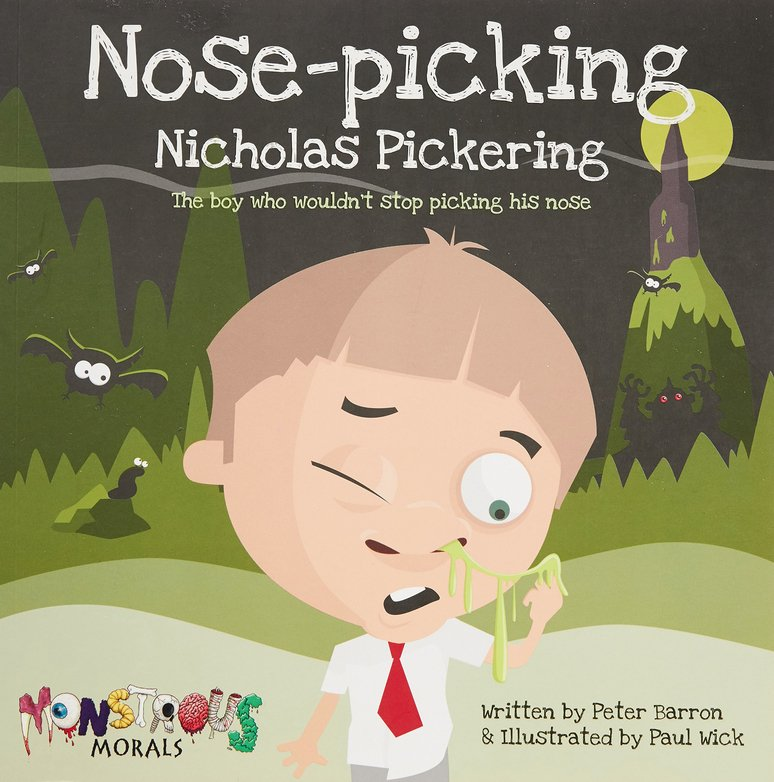Snot? That's Gross!
Is it ok to pick my nose?
While kids might not think about asking this question, adults might wonder if there are downsides to picking one's nose, besides the social stigma. For that matter, is it ok to eat boogers?!
It is actually not a good idea to try to pry snot out of one's nose because it can carry bacteria and viruses, which can then spread from the hands to other surfaces touched. Similarly, germs on fingers can spread to the nose. Picking can also irritate the delicate tissues in the nose and make them more susceptible to infection.
As far as eating boogers, while it might not be harmful, it's safer to discourage the practice since snot is something that our bodies want to dispose of.
If excessive boogers are a problem, hydrating could be a good solution because it can keep mucus thinner and easier to manage.
Mucus or Mucous -- what is it?
Snot is a drier form of the slimy, sticky substance made by our bodies called mucus. Mucus is secreted by the mucous membranes, a protective layer which lines all the external cavities of our bodies exposed to the outside environment (nose, mouth, ears, etc.). Incidentally, "mucus" is the noun and "mucous" is the adjective.
Mucus lubricates and protects those parts of our body. Fun fact -- adults and adolescents produce about one to two quarts of mucus per day when healthy!
Nasal mucus - what do our bodies do with it?
Nasal mucus helps to protect the respiratory system, including the lungs. We breathe in approximately 2,600 to 3,000 gallons of air every day and our bodies like it warm (86+F) and humid (98%). Mucus keeps the lining of our nose moist and warms the air that we breathe and the mucus dries up a bit as it does its job. Mucus is up to 90% water and 10% ions, fats, and proteins. Proteins found in nasal mucus have specific functions: mucins make mucus sticky, peptides are antimicrobial, antibodies activate our immune system, and lysozymes chop up bacteria.
When we breathe air in, dust, dirt, pollen, and microscopic organisms can enter the nose at the same time. These items can irritate or infect our lungs, and our first line of defense is nose hairs, which trap the bigger items (like small insects!). We get rid of these irritants by sneezing. As for the smaller items, including dust, viruses and bacteria, the sticky mucus secreted by our mucous membranes traps them and they are transported by tiny hairs called cilia.
Cilia (different from the nose hairs mentioned above) are about the size of a red blood cell and they work (even against gravity!) to move mucus towards the throat, where it is swallowed. Imagine a live stage performer who jumps into the outstretched arms of the audience and who is transported by all those arms -- it's as if the mucus blobs are "crowd surfing"! It's a slow process, though, because cilia move together rhythmically about 10 to 20 times per second, transporting the mucus blobs only 0.2 inches per minute (that's about 12 times slower than a snail's pace!).
So once in the stomach, the dirty mucus is destroyed by the very acidic environment there and it doesn't make it into our bloodstream where it can cause us to get ill.
Some mucus, still in the nose and carrying trapped dirt and other debris, gets dry, clumps together, and doesn't make it to the throat, and that's when we're left with a booger. Boogers can be squishy and slimy or tough and crumbly. They are a sign that our nose is working the way it should!
To get rid of boogers, the best bet is to blow them out into a tissue.
Does my snot show that I'm healthy?
Generally, clear snot means we're not sick, although snot color is not used for diagnostic purposes.
We have all experienced extra mucus (stuffed up or runny nose, etc) when we're sick or when our sinuses are inflamed. Our bodies produce extra mucus to trap and get rid of the germs and the extra mucus is generally not swallowed. Our bodies try to quickly flush out the germs and the immune system adds extra white blood cells to the mucus. In fact, the greenish color of mucus when we're sick is due to neutrophils which capture and destroy invading bacteria or microorganisms.
See the 3rd bullet point in the references section below for detailed information about the color of snot!
References and Additional Information:
- Children's Museum of Atlanta on what is snot, including recipes for making play snot - https://childrensmuseumatlanta.org/blog/what-is-snot/
- Washington State University on the spelling of mucus and mucous - https://brians.wsu.edu/2016/05/25/mucus-mucous/
- Cleveland Clinic's interactive chart on snot color - https://health.clevelandclinic.org/what-the-color-of-your-snot-really-means/
- Nemours Children's Health on boogers - https://kidshealth.org/en/kids/booger.html
- BBC on where snot comes from - https://www.bbc.com/future/article/20140321-where-does-snot-come-from
- British Society for Immunology on boogers - https://www.immunology.org/public-information/immunology-related-activities-and-resources/the-secret-life-snot
- Radio Canada on the nose - https://ici.radio-canada.ca/ohdio/premiere/emissions/moteur-de-recherche/segments/chronique/405492/nez-odeur-cinq-sens
- Scripps on fun facts about boogers -
https://www.scripps.org/news_items/6831-5-fun-facts-about-boogers





